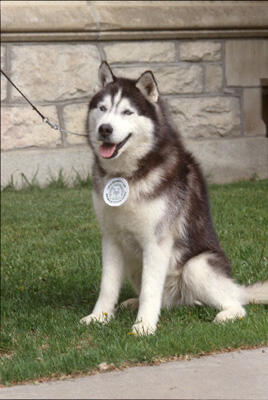
Title and statement of responsibility area
Title proper
Sports - Mascots
General material designation
- Graphic material
Parallel title
Other title information
Title statements of responsibility
Title notes
Level of description
Item
Reference code
Edition area
Edition statement
Edition statement of responsibility
Class of material specific details area
Statement of scale (cartographic)
Statement of projection (cartographic)
Statement of coordinates (cartographic)
Statement of scale (architectural)
Issuing jurisdiction and denomination (philatelic)
Dates of creation area
Date(s)
-
[ca. 1990] (Creation)
Physical description area
Physical description
1 slide : col. ; 2.5 x 3.5 cm
Publisher's series area
Title proper of publisher's series
Parallel titles of publisher's series
Other title information of publisher's series
Statement of responsibility relating to publisher's series
Numbering within publisher's series
Note on publisher's series
Archival description area
Name of creator
Custodial history
Scope and content
A husky dog with the University crest attached to its collar.
Bio/Historical Note: Green and white were established as the official colors of U of S sports teams in 1909-1910, but the Huskies name did not appear at that time. Teams were generally referred to as “varsity” or “the green and white” when they played or appeared in media. The name “Huskies” began appearing in the 1930s, first in a September 1932 article in the StarPhoenix. Media caught onto the name and continued to use it; the name appeared in the 1932-1933 edition of The Greystone - the U of S yearbook at the time - along with a photo of the men’s hockey team in uniform with “Huskies” across the front. The origin of the Huskie name is unclear, but women’s teams were generally referred to as the “Huskiettes,” while men were the Huskies. On 15 Feb. 1946, The Sheaf printed a photo of an unidentified man holding a husky canine on campus, thought to be the first mascot. The husky appeared at various sports functions to lead the players onto the field and watch from the sidelines — on a leash. The late 1970s and early 1980s were the first time that the mascot appeared as a human dressed in costume. The women’s hockey team co-coach and trainer in the 1970s, Murray Gordon, began wearing a dog outfit and appearing at hockey games as “Hymie the Huskie.” Gordon also dressed up for football games and other campus events. The Huskie was generally accepted as the official mascot by this point, and appeared in 1980 on the men’s hockey team sweaters as a side profile of a dog’s head and neck. By the 1990s however, an outward-facing head of a dog appeared on all teams’ uniforms. The first official mascot costumes were created in the 1980s as well. A woman named Elva Finlay created a Huskies mascot costume in 1985 and restored a 1980 version of the costume that same year. The two new mascot costumes were worn by two university students, Lori Winter and Chris Mirwald, who attended U of S events and Huskie games. Today, the Huskies mascot is known as “Howler” and there are multiple people employed to dress in the Howler costume as the U of S mascot.
Notes area
Physical condition
Immediate source of acquisition
Arrangement
Language of material
Script of material
Location of originals
Availability of other formats
Restrictions on access
There are no restrictions on access.
Terms governing use, reproduction, and publication
Photographer: Division of Audio Visual Services
Copyright holder: University of Saskatchewan
Copyright expires: 2040
Other terms: The researcher is responsible for obtaining copyright permission.
Finding aids
Associated materials
Accruals
Location note
Vol. 3

